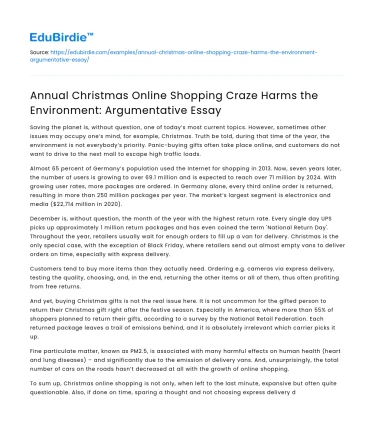Saving the planet is, without question, one of today’s most current topics. However, sometimes other issues may occupy one’s mind, for example, Christmas. Truth be told, during that time of the year, the environment is not everybody’s priority. Panic-buying gifts often take place online, and customers do not want to drive to the next mall to escape high traffic loads.
Almost 65 percent of Germany’s population used the Internet for shopping in 2013. Now, seven years later, the number of users is growing to over 69.1 million and is expected to reach over 71 million by 2024. With growing user rates, more packages are ordered. In Germany alone, every third online order is returned, resulting in more than 250 million packages per year. The market’s largest segment is electronics and media ($22,714 million in 2020).
Save your time!
We can take care of your essay
- Proper editing and formatting
- Free revision, title page, and bibliography
- Flexible prices and money-back guarantee
December is, without question, the month of the year with the highest return rate. Every single day UPS picks up approximately 1 million return packages and has even coined the term 'National Return Day'. Throughout the year, retailers usually wait for enough orders to fill up a van for delivery. Christmas is the only special case, with the exception of Black Friday, where retailers send out almost empty vans to deliver orders on time, especially with express delivery.
Customers tend to buy more items than they actually need. Ordering e.g. cameras via express delivery, testing the quality, choosing, and, in the end, returning the other items or all of them, thus often profiting from free returns.
And yet, buying Christmas gifts is not the real issue here. It is not uncommon for the gifted person to return their Christmas gift right after the festive season. Especially in America, where more than 55% of shoppers planned to return their gifts, according to a survey by the National Retail Federation. Each returned package leaves a trail of emissions behind, and it is absolutely irrelevant which carrier picks it up.
Fine particulate matter, known as PM2.5, is associated with many harmful effects on human health (heart and lung diseases) – and significantly due to the emission of delivery vans. And, unsurprisingly, the total number of cars on the roads hasn’t decreased at all with the growth of online shopping.
To sum up, Christmas online shopping is not only, when left to the last minute, expansive but often quite questionable. Also, if done on time, sparing a thought and not choosing express delivery definitely is an adequate Christmas gift to the environment.






 Stuck on your essay?
Stuck on your essay?

